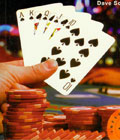问题与强迫性赌博
赌博这种行为,是会引起强迫性的问题之一,就是有问题的人往往是最后一个看到它。您可能会拿起这本小册子,因为你不知道你自己的赌博或您所关心的人赌博的习惯。我们很高兴你有胆量这样做,我们希望以下信息会增加你的这个问题的认识。
一、什么是赌博?
金钱或贵重物品,希望能赢得比你押上的风险更多的就是赌博。一个“友好的赌注”,或“绅士的赌注”,或说:“我们只是使游戏更有趣”,这是不会改变的事实,它仍然是赌博。
赌博可以包括即时购买彩票,玩上线或视频彩票游戏,扑克牌,骰子或骨牌。在赌场玩,玩老虎机,投注于体育赛事,投注赛马或赛狗,投注技能的游戏(保龄球馆,游泳池,高尔夫球场,视频或街机游戏),以及许多其他活动。
二、但是大家都不豪赌吗?
我们大多数人都围坐的时候,我们会赌的。如果我们赢了彩票,或会有拉斯维加斯大幻想。但对大多数人来说,这些幻想仍然幻想。也许我们偶尔购买彩票,但仅此而已。而有些人可以使赌博不影响他们的生活。
但许多人做不到。“时代”杂志估计,有近800万在美国的强迫性赌徒,其中有一百万是青少年。伊利诺伊州的刑事司法教授发现,在成年人中的大学生是许多赌博成瘾者的八倍。言归正传,由得克萨斯州议会上的问题和强迫性赌博的研究发现,青少年和年轻成年人在发展严重的赌博问题比成人的风险更大。
在得克萨斯州中部地区(包括奥斯汀),赌徒更可能是一个白人男性(虽然肯定包括女性和少数族裔),且年轻,没有结婚,相对受过良好教育,但收入偏低。
更何况与其他地区的赌徒相比,对于来自德克萨斯州中部的赌徒说,他喜欢赌博游戏技巧,视频彩票,体育赛事,高风险的投资,和纸牌游戏。他说:他输光了好奇心的挑战,他更可能有酒精或药物的使用。他报告的实质问题较多,这些问题赌徒也呈现出较低的学术档次,他们更容易逃学。
三、朋友赌博怎么办
正如我们在开头所说,帮助有赌博问题的人最难做到的事情之一,他们很可能否认他们有任何问题,即使身边的人表现得很明显。“这对我来说没有问题,我可以在任何时间退出。” “这不是什么大不了的事,我可以弥补我的债务。” “当我手气旺的时候,我甚至赢回超过了我已经失去的。” “我所有的朋友做大学生足球赌注,只是为了好玩。”
如果你认为朋友有赌博问题,显示出您的关注。不要回避的话题,避免说教,讲座,判断和言语攻击。但是,如果你开始感到不耐烦或生气,不要继续交谈。您可能会遇到的防御和拒绝。不要这一个人出动,但要表现你的担心,并告诉他或她的赌博行为如何影响你。您可能会受到人的限制,不要被操纵,要学会辩解。要合理化,俯瞰,避免出现参与人的弄巧成拙行为。
(一)、如果他人同意,他或她有问题,尝试解决;
(二)、要支持和鼓励他,哪怕是努力后的很小变化;
(三)、落实一个恢复过程中,需要准备的正常组成部分的一些步骤;
(四)、帮助赌徒建立起与赌博心里辅导及心理卫生中心这些组织的联系。
(五)、不鼓励相关的赌博活动,遏制自己的赌博行为。
译文:
Problem & Compulsive Gambling
One of the biggest problems related to gambling and other compulsive and addictive behaviors is that the person with the problem tends to be the last one to see it. You probably picked up this brochure because you wondered either about your own gambling or the gambling habits of someone you care about. We're glad you had the courage to do so, and we hope the following information will increase your understanding of this problem area.
What is Gambling?
Risking money or valuables in hopes of winning more than you're risking is gambling. Calling it a "friendly bet," or a "gentleman's bet," or saying "We're just making the game a little more interesting" does not alter the fact that it is still gambling.
Gambling can include buying instant lottery tickets, playing the on-line or video lottery games, playing cards, dice, or dominoes, playing in casinos, playing slot machines, betting on sporting events (with or without a bookie), betting on the horses or greyhounds, betting on games of skill (bowling, pool, golf, video or arcade games), and many other activities.
But Doesn't Everybody Gamble?
Most all of us have sat around and fantasized about what we would do if we won the lottery or hit it big in Las Vegas. But for most of us, these fantasies remain fantasies. Perhaps we buy an occasional lottery ticket, but that's about it. And some people can gamble occasionally without it affecting their lives seriously.
But many can't. Time magazine estimates that there are nearly eight million compulsive gamblers in America, one million of whom are teenagers. An Illinois criminal justice professor found eight times as many gambling addicts among college students as among adults. Closer to home, a study by the Texas Council on Problem and Compulsive Gambling found that teenagers and young adults are at much greater risk for developing serious gambling problems than are adults.
In the central area of Texas (including Austin), the average gambler was more likely to be a White male (although females and minorities are definitely included), younger, never married, relatively well educated, but with an income on the low side.
More so than gamblers from other regions, the gambler from Central Texas said he liked gambling on games of skill, video lotteries, sporting events, high-risk investments, and card games. He said he gambled out of curiosity or for the challenge, he was more likely to have used alcohol or drugs, and he reports a higher number of substance problems. These problem gamblers also had significantly lower academic grades, and they were more likely to skip school.
What if a Friend has a Gambling Problem?
As we said at the beginning of this brochure, one of the hardest things about helping people with gambling problems is that they are very likely to deny they have any problem even when it's obvious to people around them. "It's no problem for me. I can quit any time I want." "It's not a big deal. I can cover my debts." "When I'm hot, I win back even more than I've lost." "My friends all bet on college football-it's just for fun."
If you think a friend has a gambling problem, show your concern. Don't avoid the topic. Do avoid sermons, lectures, judging and verbal attacks, however. Don't continue the conversation if you begin to feel impatient or angry. You may encounter defensiveness and denial. Don't take this personally, but make it clear you're concerned and tell the person how his or her gambling behavior affects you. You may have to set limits with the person. Don't be manipulated into excusing, justifying, overlooking, enabling or participating in the person's self-defeating behaviors.
If the person agrees that he or she has a problem, try to:
Remain supportive and reinforce even small efforts toward change.
Be prepared for some steps backward as a normal part of the recovery process.
Help the person make contact with recovering gamblers and organizations like the Counseling & Mental Health Center and Gamblers Anonymous.
Encourage activities that are not related to gambling, and curb your own gambling behaviors.
- 上一篇:飓风艾琳大满贯大西洋城的博彩收入
- 下一篇:麻将规则
相关推荐
随机专题



 您现在的位置:
您现在的位置: 
 斗地主新玩法
斗地主新玩法 网上打麻将赌博挣钱的方法
网上打麻将赌博挣钱的方法 网络百家乐游戏胜负因素 荷官因素不可小瞧
网络百家乐游戏胜负因素 荷官因素不可小瞧 德州扑克怎么赢钱 德州扑克赢钱的秘诀
德州扑克怎么赢钱 德州扑克赢钱的秘诀


